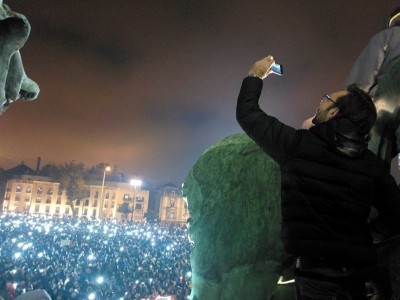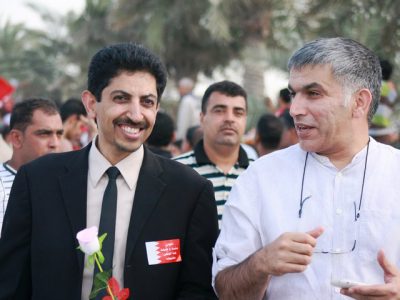
Saudi women's rights activist Loujain Alhathloul is one of many human rights defenders who remain in jail in the Middle East, despite multiple calls to release them amid COVID-19 fears. Photo credit: Loujain Al-Hathloul via OTRS system / CC BY-SA.
This post was written by Khalid Ibrahim, executive director of the Gulf Center for Human Rights (GCHR), an independent, nonprofit organisation that promotes freedom of expression, association and peaceful assembly in the MENA region.
COVID19 cases in the MENA region have led governments to institute containment and other measures to slow the spread the highly contagious coronavirus.
These measures have especially targeted some of the most vulnerable groups such as human rights defenders in prison, migrant workers and independent media.
The Gulf Center for Human Rights have tracked how some of these measures have seriously impacted the overall human rights situation in the region.
Many of these unfair actions violate international law. Migrant workers and detained prisoners, for example, who often live in substandard living conditions, are actually protected by the Universal Declaration of Human Rights (UDHR), Article 25:
Everyone has the right to a standard of living adequate for the health and well being of himself and of his family, including food, clothing, housing and medical care and necessary social services, and the right to security in the event of unemployment, sickness, disability, widowhood, old age or other lack of livelihood in circumstances beyond his control.
Below is GHCR's brief human rights review of COVID-19's impact on the MENA region:
1. Detained human rights defenders

Bahraini human rights defenders Nabeel Rajab (right) and Abdulhadi Al-Khawaja remain in prison, despite calls to release them and all political prisoners in the Middle East. Photo credit: Bahrain Centre for Human Rights / CC BY-SA.
The reality is that most human rights defenders are still in prison in the MENA region at a time when governments including those of Morocco, Saudi Arabia, and Egypt released some prisoners as part of preventive measures to contain the spread of the virus. With the spread of COVID-19, the lives of jailed human rights defenders are at imminent risk in countries such as Iran, Egypt, Kuwait, Syria, Bahrain, Saudi Arabia, the United Arab Emirates, Algeria and other countries that have crowded prisons lacking minimum health standards.
Among those currently imprisoned are Abdulhadi Alkhawaja and Nabeel Rajab, founding directors of the GCHR, serving a life sentence and five years in jail, respectively. In the United Arab Emirates, Ahmed Mansoor has been held in solitary confinement for three years, serving a 10-year jail sentence for his human rights activism, including peacefully expressing his views on social media. In Saudi Arabia, women's rights activist Lugain al-Hathloul also remains in prison.
2. Access to information and shutting down newspapers
Most governments in the MENA region are not releasing the actual numbers of cases of those infected with the virus and also making it very difficult for journalists to have access to reliable information about the spread, treatment, and the victims of COVID-19. Also, journalists who are providing factual information about the crisis to citizens are at risk.
For example, in Yemen, on March 23, 2020, Muammar Al-Aryani, the minister of communications in the government of President Abd Rabbu Mansour Hadi, issued a decree bearing the number (6) for the year 2020, which stated in its first article, “The issuance of government newspapers and private ‘paper’ newspapers will be suspended and only electronic copies will be issued.” This is for the period from March 25 to April 12, 2020, as stated in Article (2) of the decree therein, as part of the package of preventive and precautionary measures taken by the government to prevent the spread of COVID-19.
In Oman, on March 22, 2020, the Supreme Committee for Dealing with COVID-19 ordered all newspapers, magazines, and other publications to cease printing and circulating, according to the Times of Oman, which published the committee’s order. The order also prohibited the sale and circulation of newspapers, magazines and publications imported into the country.
In Morocco, that same day, the minister of culture, youth and sports, Hassan Abyaba, announced in a statement the suspension of the publication and distribution of print newspapers until further notice.
Also, in Jordan, on March 17, 2020, the Jordanian Council of Ministers suspended the publication of all newspapers for two weeks, according to an official statement by the Jordanian Communications Minister Amjad Adaileh. Newspapers continued to be suspended due to the quarantine and the government's demand for citizens to stay in their homes.
3. Draft law threatens freedom of expression in Tunisia
Draft law No. 29/2020 on amending Articles 245 and 247 of the Penal Code provisions were submitted to the Tunisia parliament on March 29. The bill, which was withdrawn a day later following the outcry from civil society groups and citizens, sought to criminalise the ”disclosure of any false or questionable speech among users of communication networks and social media platforms, which may be insulting to individuals, groups or institutions.”
The bill was a blatant contradiction with Articles 31, 32, and 49 of the Tunisian Constitution, and Article 19 of the International Covenant on Civil and Political Rights, which was ratified by the Republic of Tunisia. If adopted, it would have inevitably canceled several Articles of Decree Law 2011-115 of 2 November 2011 on freedom of the press, printing and publishing, as it contains comprehensive legal provisions for the offenses of publishing false news (Article 54) and calumny (Article 55 and 56).
4. Temporary imprisonment for spreading rumours in UAE
On April 1, 2020, the Gulf News, a daily English-language newspaper based in Dubai, published an article that says that “people who circulate rumours may be jailed for one year if they spread false information.” It is now possible that COVID-19 could be used as a pretext to imprison some of the bloggers and Internet activists who are targeted by the State Security Apparatus (SSA).
5. Location-tracking applications
Some Gulf states such as Bahrain are using location-tracking technologies which would enable the full detection of the movement of citizens. There are concerns that the use of these applications in countries widely known for gross and documented violations of human rights will allow them to place greater restrictions on personal freedoms.
6. Xenophobia against migrant workers in the Gulf
In Kuwait, in an interview on March 31, 2020, actress Hayat al-Fahad called for migrant workers to be thrown out of the country as it faces the COVID-19 crisis.
On March 10, 2020, after a picture was published of a Saudi Aramco migrant worker dressed as a giant bottle of sanitiser, the oil company came under fire for such inhumane ill-treatment of the worker, which could be classified as racist. The company later applogised.
Reports that GCHR received from various Gulf countries confirmed that migrant workers are not given equal access to medical care and they are facing some difficult time at the moment, as many of them already live and work in poor conditions.
Authorities across MENA could help stop the spread of COVID-19 by freeing all human rights defenders and prisoners of conscience because they do not pose a risk to the public — but rather are at great risk themselves. While detained, authorities must uphold the UN Standard Minimum Rules for the Treatment of Prisoners to provide basic healthcare and sanitation for all. It is also important to allow visits from UN experts and the International Committee of the Red Cross (ICRC).



